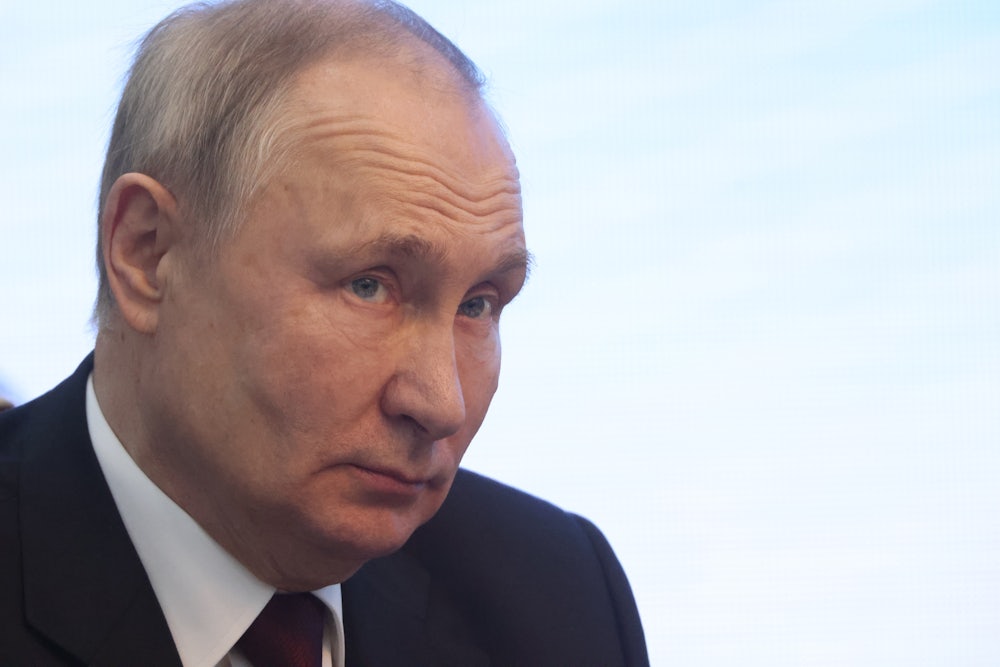Just over 30 years ago, in the summer of 1991, President George H.W. Bush touched down in Kyiv to try to tap the brakes on the Soviet Union’s spiraling dissolution. Speaking to the Soviet Ukrainian legislators, Bush criticized those who promoted “suicidal nationalism,” all but coming out against Ukrainian independence. “Freedom,” Bush said, “is not the same as independence.”
The speech was roundly panned, and not only in Kyiv. In the United States, columnist William Safire dubbed it Bush’s “Chicken Kiev” speech, which not only made Bush “appear to be anti-liberty” but turned him into a figure who “jeopardized our relations with an emerging European power.” And it was obviously for naught; shortly after Bush’s admonitions, Ukrainians voted en masse—across every region, including Crimea—for independence from the Kremlin. Three decades later, Ukrainians still continue to fight for independence from a revanchist Moscow. That fight now serves as inspiration for any number of populations colonized by the Kremlin.
Now, as Russia barrels toward defeat, questions and conversations have begun circling about Russia’s future, in a way we haven’t seen since the Soviet collapse. Legacies of Russian colonialism have resurged to relevance—and not just in former Soviet republics. Over the past few months, those non-Russian populations still considered part of Russia have begun having far more pointed, and far more pronounced, conversations about their roles in the Russian Federation—and what future, if any, they should have with Moscow. The viability of the Russian Federation is, suddenly, very much up in the air.
And yet the lessons of Bush’s speech appear to be lost. Because as conversations about the disintegration of the Russian Federation pick up pace, prominent Western voices apparently can’t help but swoop in to tell these populations still colonized by Moscow that they shouldn’t dream of any kind of independence—that their states would, much as Bush told Ukrainians decades ago, never be viable.
In August, George Washington University professor Marlene Laruelle said that the “idea that ethnic minorities will create stable, prosperous and happy states is more than naive.” More recently, and more specifically, British scholar Mark Galeotti shared his thoughts on potential Russian fracture on his popular podcast over the weekend. In the North Caucasus—scene of Russia’s first neo-imperial wars in the 1990s, when Moscow resorted to torture and despotism to smother Chechnya’s push for independence—Galeotti said that any constellation of newly independent nations “would not on the whole be at all viable states.”
Galeotti then turned eastward, to the Sakha Republic, a sprawling Siberian polity that exists as the traditional home of the Sakha nation. “Physically, it is the biggest republic within the Russian Federation,” Galeotti said, outlining the scope and scale of Sakha, which runs nearly one-third of the size of the U.S. But with a population of only one million citizens, an independent Sakha “is not in any way a viable state,” Galeotti claimed.
Neither Laruelle nor Galeotti outlined their reasons why any new states in the North Caucasus or Sakha would not be “viable.” But the subtext is impossible to miss. Much as Bush chided Ukrainians in 1991, Western voices have now begun explaining to the ethnic minorities colonized by Russia many centuries ago that a future with Moscow is their only option. Any restructuring of Russia’s territorial integrity, these voices claim, will result in failed states—and potentially worse.
Watching Western voices explain to colonized nations why any efforts toward independence are doomed to failure is jarring—especially when they come from white, European voices. But it’s of a type with a phenomenon that’s gained popularity in recent years: “Westsplaining.” As Jan Smoleński and Jan Dutkiewicz explained in The New Republic earlier this year, this phenomenon sees “people from the Anglosphere loudly foisting their analytical schema and political prescriptions” on regions formerly colonized by Moscow. While Smoleński and Dutkiewicz focused primarily on Eastern Europe—and especially the Western voices telling Ukrainians to give up, to cede territory, and to return to Moscow’s embrace—it’s not difficult to extend this framing to those in Washington, London, and Paris who are suddenly explaining to those colonized nations that are still suffering under the Kremlin’s dictatorship why they have no choice but being tethered to Moscow, at least for decades to come.
This subgenre of “Westsplaining” has a lengthy pedigree. Not only did we see it with Bush and Ukraine, but Poland and the Baltic states experienced similar Westsplaining back when those nations first started asserting their own independence. Nor is it necessarily limited to the Russian empire; during the crumbling of the British, French, and other European empires, criticisms of the “viability” of former colonies was never far from European officials’ lips. If anything, “Westsplaining” is as old as European empire. And with Russia as the final European empire remaining, it’s perhaps not a surprise that we’re starting to see this “Westsplaining” reemerge as the Kremlin’s grip on its colonies begins slipping.
But the entire framing behind this kind of “Westsplaining” is analytically stunted. Not only is it ironic—it’s the Russian Federation, not Moscow’s colonies, that grows less and less viable by the day—but it also forces Western policymakers to miss the opportunities that present themselves. For instance, instead of building early, deep links with Ukraine, the U.S. routed much of its post-Soviet policy through Moscow, not least out of a concern for the “viability” of the newly independent states. Likewise, the emphasis on downplaying these colonies’ “viability” has also led Western policymakers to miss a bigger story: Russia’s inherent fragility. As Mikhail Khodarkovsky, one of the leading scholars on Russian colonialism, recently wrote, “Centuries of pent-up bitterness and frustration over rule by Moscow may spill into a military confrontation and civil war.… If and when that happens, Russia will fall apart as the empire of the czars and Soviet Union did.”
It is also the case that these claims against the viability of new states are wrong. Take Sakha, for example: Russians first began slaughtering the Sakha in the 1630s, with Russian forces requiring over a half-century to finally subdue them and begin seizing their land, installing slavery, torture regimes, and routine hostage-taking as matters of course. “To the Sakha, Russian rule brought all the usual ills,” Anna Reid wrote. During that half-century of initial Russian conquest, the Sakha population fell by as much as 70 percent.
And yet, despite the decimation, the Sakha survived, rebuilding their population base. They also fought. Century after century, Sakha launched revolt after revolt against Moscow and St. Petersburg, first against tsarist officials and then against the Bolsheviks. During the late Soviet period, things were hardly better: “Frequent ethnic brawling” was routine, with “no-go areas for Slavs” in many Sakha towns. Things were so bad that Soviet troops were forced to intervene in 1979, with ethnic riots rocking the region a few years later. All of it culminated in the early 1990s, when Sakha leadership affirmed Sakha’s right to secede, to form its own army, and to declare that all Sakha natural resources belonged “to the Sakha population.”
And what natural resources they are: billions of dollars in diamond mines, deep deposits of gold, a hydrocarbon industry that is “of great importance … for all of Russia.” Toss in sea access—which will only improve as the Arctic Sea, unfortunately, warms—and the Sakha Republic suddenly begins looking far more “viable” than many of the former Soviet republics, all of which have now enjoyed decades of independence. But thanks to the Kremlin’s neo-imperialism, much of Sakha remains impoverished and underdeveloped—and Sakha residents have now become cannon fodder for Russia’s war in Ukraine.
None of this is to say Sakha independence is, or even necessarily should be, forthcoming. That is a decision for Sakha residents, and especially those among the Sakha nation butchered and bludgeoned by Russian forces for centuries. But the Westsplainers have it all wrong: The Sakha Republic has more than enough cohesion, resource base, and historical identity to emerge as the first fully independent Siberian nation. These notions that Sakha—or any of the other extant Russian colonies—would not be “viable” are founded on farce, not facts.
It’s also a wildly patronizing discussion, especially in light of what’s happening in Ukraine right now. Bush, to his limited credit, at least recognized how off-putting such patronizing attitudes could be. As he told Ukrainians three decades ago, “Theodore Roosevelt, one of our great presidents, once wrote: To be patronized is as offensive as to be insulted.” Which is precisely right. This is why Westerners should stop insulting those nations colonized by Russia and should start listening to them instead—and start preparing for what comes next.










